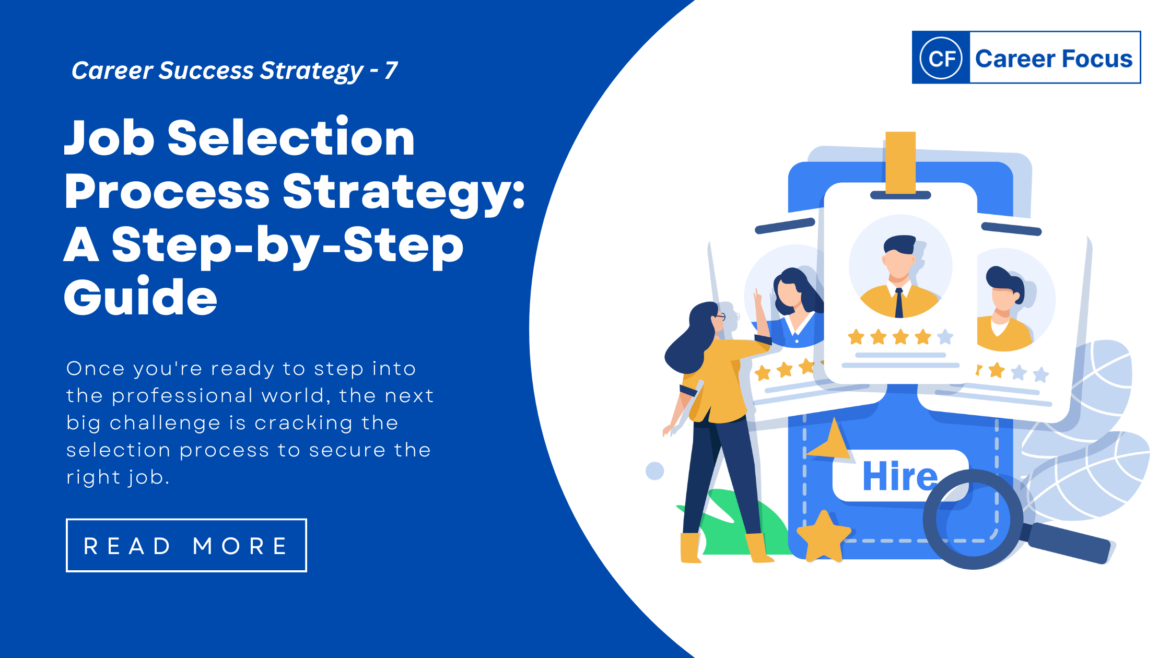Table of Contents
Once you’re ready to step into the professional world, the next big challenge is cracking the selection process to secure the right job. Many candidates apply for jobs in various companies, but only those who prepare strategically stand out and get selected.
Each company has its own process for identifying the right candidate based on job requirements, criticality, and urgency of the vacancy. Even if you have the skills and talent, you may not get selected if you lack preparation.
This strategy helps you align all elements—from resume building to final interviews—so that you successfully navigate the hiring process and secure your ideal job.
Download Your Free Career Success Blueprint!
Unlock expert career strategies and take your professional growth to the next level.
Download Free E-bookUnderstanding the Selection Process
Companies evaluate candidates through multiple stages to determine their suitability. These may include written tests, interviews, group discussions, technical assessments, HR rounds, and background verification.
The table below provides an overview of the typical hiring stages in most companies:
Typical Stages of a Selection Process
| Stage | Purpose | Preparation Tips |
|---|---|---|
| Resume Screening | Shortlist candidates based on education, experience, and skills. | Customize your resume for each job, highlighting key skills and achievements. |
| Written Test (Aptitude/Technical) | Assess problem-solving, logical reasoning, and domain knowledge. | Practice aptitude questions and brush up on technical concepts relevant to the role. |
| Group Discussion (GD) | Evaluate communication, leadership, and critical thinking skills. | Stay updated on current topics and practice speaking confidently in a group. |
| Technical Interview | Assess depth of subject knowledge and practical skills. | Prepare projects, case studies, and industry-specific knowledge. |
| HR Interview | Check cultural fit, salary expectations, and career aspirations. | Research company culture and practice answering behavioral questions. |
| Background Verification | Verify past employment, education, and references. | Ensure all details in your resume are accurate and truthful. |
Key Components of an Effective Selection Process Strategy
1. Crafting a Professional Resume
Your resume is the first impression that recruiters get. A well-crafted resume increases your chances of getting shortlisted.
Tips for a Strong Resume:
- Keep it concise (1-2 pages max).
- Use action words like “led,” “managed,” and “optimized.”
- Customize your resume for each job application.
- Quantify achievements (e.g., “Increased sales by 25% in 6 months”).
- Include keywords from the job description to pass ATS (Applicant Tracking Systems).
2. Preparing for Written Tests
Many companies conduct aptitude, logical reasoning, or domain-specific tests to assess candidates.
3. Mastering Group Discussions (GD)
Group discussions are used to test communication skills, teamwork, and leadership.
How to Succeed in a GD:
✔ Stay calm and confident.
✔ Speak clearly and concisely.
✔ Listen actively and build on others’ points.
✔ Support arguments with facts and logic.
✔ Avoid interrupting or dominating the discussion.
4. Preparing for Interviews
Interviews are the most crucial stage of selection. There are different types of interviews, including technical, HR, and behavioural.
Common Interview Questions & How to Answer
| Question Type | Example Questions | Best Approach |
|---|---|---|
| Technical Questions | Explain the key concepts of [your field]. | Be clear and precise. Use examples from past projects. |
| Behavioral Questions | Tell me about a time you solved a major problem. | Use the STAR method (Situation, Task, Action, Result). |
| HR Questions | Why do you want to work with us? | Showcase your knowledge of the company and align it with your goals. |
| Salary Negotiation | What are your salary expectations? | Research salary trends and be ready to negotiate confidently. |
Final Preparation Steps: Checklist Before the Interview
Before appearing for the selection process, ensure you have everything ready:
✔ Updated Resume: Tailored to the job role.
✔ Documents: Degree certificates, work experience letters, ID proof.
✔ Professional Attire: Dress appropriately for in-person or virtual interviews.
✔ Company Research: Know their values, services, and work culture.
✔ Mock Interviews: Practice common questions with friends or mentors.
Final Thoughts
A better-prepared candidate can outperform a more qualified but underprepared candidate. The selection process is competitive, and employers have many options. However, a well-planned selection process strategy can help you stand out and secure your dream job.
🔹 “Opportunities don’t happen. You create them.” – Chris Grosser
By strategizing, practising, and staying prepared, you can confidently navigate the selection process and land the right job.

